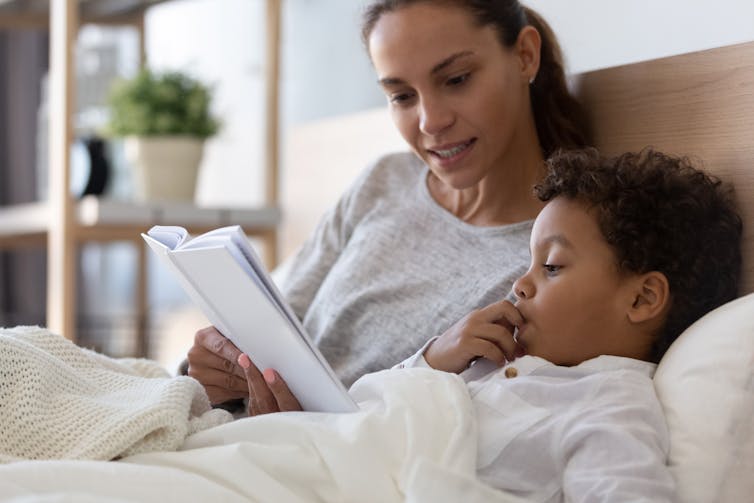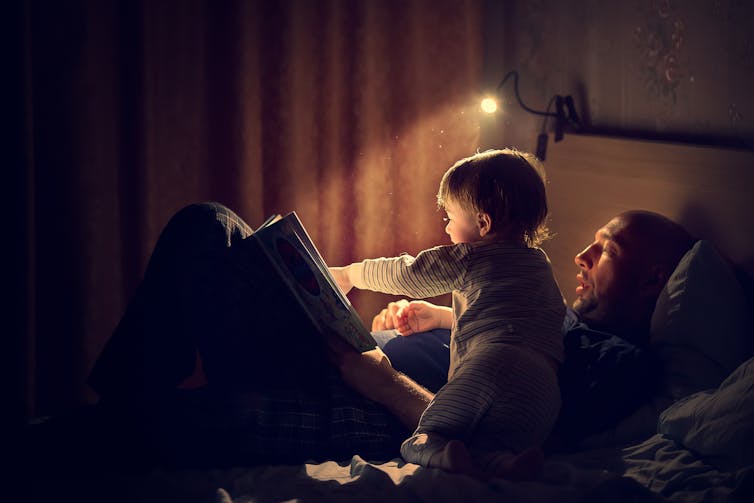
Anna’s mother is a GP, and each day, as Australian schools endured regular lockdowns, her mother travelled to work on the frontline.
Her father stayed home, taking over the household duties and looking after Anna, 10, and her 14-year-old sister.
“I loved that my dad finally stayed home and I got to know him for the first time in my life,’’ she told me.
But the judgement she delivered on her mother is brutal. What she remembers most, she says, is that her mother would arrive home and not hug her – or at least, not until she’d had a shower.
Anna, whose name has been changed, is one of 500 10-year-old girls I consulted last year while researching my book,
Ten-Ager – what your daughter needs you to know about the transition from child to teen
.
And they taught me how much we, as parents, we might not know about the tweens in our lives. COVID-19 is just one example.

We try to keep our children safe from the virus itself, but what about its impact on the family unit?
Photo: Getty
I met Annas everywhere, who explained the silver lining in this pandemic:
more time with dad
. Being at home allowed dads the opportunity to engage in a game of cards, take a bike ride after work and share dinner together every night.
Long conversations replaced many of the short procedural chats on the drive between home and school. Girls noticed this, and raised it without prompting: Dad was home. Dad had dinner with us every night. Dad and I did this. Dad and I did that.
But when it came to Mum – when she worked outside the house in an essential service – girls were routinely harsh in their judgement.
“She chose them, not me,’’ Anna says.

A teddy bear placed in a window as part of a bear hunt game for children amid the coronavirus lockdown.
This is an interesting insight into biases, but it is also a telling example of how some of our 10-year-olds saw – and continue to see – the coronavirus as a threat to their safety and security.
For parents, it’s worth thinking about as the daily news cycle bounces between getting on with our lives and heading back home to wear masks.
For some, the pandemic was a bonus. Sleep-ins. Bullying complaints dropped. The marks of shy girls, and some on the spectrum, improved markedly. Anxiety decreased in some households, too.
But for many children, the ongoing uncertainty remains plain scary.
“At the end of this pandemic, will life ever go back to normal again, and when family are sick, will they ever get better?’’
That’s one question posed by a 10-year-old girl.
‘“I was scared,’’ another says.
Others told of their inability to sleep unless one of their parents was lying in bed with them, how they cried because they didn’t want to do school at home, how they missed their friends and wondered whether they’d ever see them again, how they missed their grandparents and their teachers and their playground and their sports, how they had to withdraw from theatre and ballet and Scouts, and how they worried that their family – mostly their mother – might die.

Young children are another knock-on casualty of the coronavirus pandemic.
Numerous studies both here and overseas pointed to increases in anxiety, stress and depression, and the need for that to be addressed.
One study, by UNICEF Australia, found that only 52 per cent of boys and 38 per cent of girls aged 13 to 17 were coping well in mid-2020.
It is unlikely to have been much different for 10-year-olds.
The struggles girls had with COVID were raised by many parents. Here’s a handful of representative comments:
‘She does not want us to use the word “corona” anymore.’
‘She is concerned about the world ending and never having achieved.’
‘I’m in treatment for breast cancer so she’s worried I will die if I get the virus.’
‘I’m a doctor so I’m working huge hours and often exhausted. She is envious of her friends who have their mums at home.’
She has cried a lot over this. She is afraid our family might get it.”
‘She keeps going over and over the problems (i.e. Why would someone eat a bat?).’
‘She has made some badges saying “Corona Virus Survivor”.’
‘She was washing her hands so much they were cracking and bleeding. She wasn’t sleeping because she caught a cough and kept panicking that she had COVID.’
Themes developed: of missed rites of passage, like school trips to Canberra and leadership ceremonies; missed birthday parties; upset routines; worries because mum or dad had lost their jobs. Daughters, according to medical experts, worried about these things more than sons.
School principals also noticed a decline in socialisation skills when schools resumed. Tweens were unable to look at each other, or talk to each other because they’d forgotten how.

Some children have found it difficult to adjust to returning to school – and the socialising that goes with it.
Photo: Getty
Some schools are now specifically addressing that, along with individualised learning programs. School refusal has also increased; where girls are simply refusing to go to school, post lockdown.
Professor Sarah Blunden, the head of paediatric sleep research and a lecturer in clinical psychology at Central Queensland University, says part of the problem is the lack of control children – and adults – had with this pandemic.
“It’s not just about sleeping. It’s about everything,” she says.
“But when you are lying in bed at night, trying to sleep, and you’ve got less activity going on in your brain and your body, what’s going to come in? What are you thinking about?
Worries.
And what are you going to worry about? The most relevant thing on everybody’s mind. And 10-year-olds are going to be struggling much more than you or me.”
That’s worth remembering. In the daily political posturing about closures and quarantine, masks and restrictions on the dance floor, what are our children hearing? And how do we help them?
Madonna King, a weekly columnist, is also the author of
Ten-Ager, what your daughter needs to know bout the transition from child to teen
The post
Madonna King: Think our children got through the pandemic unscathed? Think again
appeared first on
The New Daily
.
chevron_right





 Adequate sleep is key to good health.
It’s worth noting that most of the studies on this question are cross-sectional, which means they look at data from a population at one specific point in time.
Adequate sleep is key to good health.
It’s worth noting that most of the studies on this question are cross-sectional, which means they look at data from a population at one specific point in time.
 Try to stick to the same bedtime.
Try to stick to the same bedtime.




